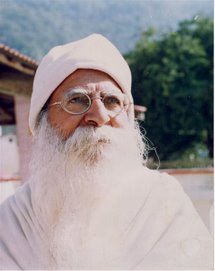We have said that Maharajji is now working hard and without interruption to turn the hearts of men to God. The question which one could ask is whether all men on the Earth are able to practise spirituality today. One could first of all answer that he who has a soul (and everyone does) must nourish this soul in the same way that he who has a body must nourish it. And the soul is nourished by spiritual practice. One could also say that apart from some rare exceptions, today humanity on the whole is advanced enough for all its units to turn to such a practice. Things are more logical than they seem at first glance, as we will briefly explain.
The Great Journey
According to Eastern teachings and also that of certain Western mystical brotherhoods, men have not come to the Earth by chance. There is a divine Plan which governs his stay here which is a very long journey, the aim of which is to acquire more divine wisdom. Consequently, when the time for what we usually call “creation” comes, (which is, in fact, only the awakening to a new activity of God’s life in the manifested universe after a period of rest, these cycles of activity-rest being repeated endless), successive waves of life descend from the divine plane to come down to the Earth so as to start their period of learning and return to God’s bosom once they have acquired wisdom. This whole process of coming down and going back up to the Divinity could rightly be called the Great Journey and it has been going on for millions of years... And humanity on the whole is beginning to start its upward journey. Naturally, certain human units started off before others, for certain reasons which we will not mention here so as not to make our article too complex. These units in advance are those who are Masters, including those of the Sacha lineage.
According to Eastern teachings and also that of certain Western mystical brotherhoods, men have not come to the Earth by chance. There is a divine Plan which governs his stay here which is a very long journey, the aim of which is to acquire more divine wisdom. Consequently, when the time for what we usually call “creation” comes, (which is, in fact, only the awakening to a new activity of God’s life in the manifested universe after a period of rest, these cycles of activity-rest being repeated endless), successive waves of life descend from the divine plane to come down to the Earth so as to start their period of learning and return to God’s bosom once they have acquired wisdom. This whole process of coming down and going back up to the Divinity could rightly be called the Great Journey and it has been going on for millions of years... And humanity on the whole is beginning to start its upward journey. Naturally, certain human units started off before others, for certain reasons which we will not mention here so as not to make our article too complex. These units in advance are those who are Masters, including those of the Sacha lineage.
The two Guides
This period of learning during the Great Journey takes place under the aegis of two great divine laws, that of Cause and Effect or karma and that of successive rebirths. These two laws lead to a third which is the law of Love-Wisdom, love and wisdom being the two sides of the same coin.
This period of learning during the Great Journey takes place under the aegis of two great divine laws, that of Cause and Effect or karma and that of successive rebirths. These two laws lead to a third which is the law of Love-Wisdom, love and wisdom being the two sides of the same coin.
The Law of Justice
The law of Cause and Effect is a law according to which each cause produces a similar effect or consequence. It is also rightly called the law of Compensation. For example, if someone does something good for someone else, sooner or later he will benefit from an act of similar kindness from another person when he most needs it, this other person only being the intermediary used by the law of Cause and Effect. On the other hand, if he acts wrongly, thus causing his brother to suffer, sooner or later someone else will act towards him in a similar way, and so he will suffer in the same way, at the most suitable time, in order to learn the lessons which he most needs to learn. This law is called the law of karma in the Hindu and Buddhist religions. It is a law of justice which, in both the spiritual and material domains, gives each one exactly what he deserves. In short, and as it is often said, each person reaps exactly what he has sown. The aim of this law is not to punish, but to guide people unfailingly through time (and thus during different lives), towards wisdom and love by making people understand the right lessons to be learnt from their behaviour, whether in the domain of thought, word or deed.
The law of Cause and Effect is a law according to which each cause produces a similar effect or consequence. It is also rightly called the law of Compensation. For example, if someone does something good for someone else, sooner or later he will benefit from an act of similar kindness from another person when he most needs it, this other person only being the intermediary used by the law of Cause and Effect. On the other hand, if he acts wrongly, thus causing his brother to suffer, sooner or later someone else will act towards him in a similar way, and so he will suffer in the same way, at the most suitable time, in order to learn the lessons which he most needs to learn. This law is called the law of karma in the Hindu and Buddhist religions. It is a law of justice which, in both the spiritual and material domains, gives each one exactly what he deserves. In short, and as it is often said, each person reaps exactly what he has sown. The aim of this law is not to punish, but to guide people unfailingly through time (and thus during different lives), towards wisdom and love by making people understand the right lessons to be learnt from their behaviour, whether in the domain of thought, word or deed.
Moreover, as long as an individual creates karma, whether it be the type which brings satisfaction (this is usually called “good” karma) or suffering (“bad” karma), he cannot attain perfection and has to come back again and again to reap the fruit of this karma. Only a selfless action does not create either good or bad karma. This is stressed in the Bhagavad Gita 3:19,
“Therefore, always perform your duty efficiently and without attachment to the results, because by doing work without attachment one attains the Supreme..”
The Law of Time
The law of successive births or the law of Reincarnation is the one according to which as long as an individual has not attained divine wisdom, he must come back to the Earth as often as necessary to continue his training. Consequently man lives several successive lives which bring him closer and closer to divine perfection. Finally, all this seems logical for in the material world, as long as a young person in a school has not yet passed the diploma which he needs to get a job, he comes back year after year to study in a school or university. A person who would require that man reach perfection in only one life to go and sit with God and His angels would not at all be wise...
The law of successive births or the law of Reincarnation is the one according to which as long as an individual has not attained divine wisdom, he must come back to the Earth as often as necessary to continue his training. Consequently man lives several successive lives which bring him closer and closer to divine perfection. Finally, all this seems logical for in the material world, as long as a young person in a school has not yet passed the diploma which he needs to get a job, he comes back year after year to study in a school or university. A person who would require that man reach perfection in only one life to go and sit with God and His angels would not at all be wise...
An Essential Knowledge
If one wanted to make an analogy between the Great Journey and school, one would say that spiritual perfection is to the Great Journey as the final diploma is to the school, the law of karma representing the mark scheme (the karma gained by a person represents his marks) while the successive lives play the role of the different school years.
If one wanted to make an analogy between the Great Journey and school, one would say that spiritual perfection is to the Great Journey as the final diploma is to the school, the law of karma representing the mark scheme (the karma gained by a person represents his marks) while the successive lives play the role of the different school years.
Put together, these two laws explain in most cases, the differences in material wealth and the level of spiritual evolution between men. However, there are exceptions concerning material things, since, for example, the wealth which a robber gets by looting is not at all provided by karma, but by the temporary violation of this law. Later on, this law will catch up with the robber and will demand that he completely pay for his acts, for no one can escape from its justice.
When one does not know about these two important laws, it sometimes happens that one thinks that finally, either God does not exist in the way religions present Him, or that if He existed, he would be unjust because there is too much misery and suffering in the world and He does nothing about it, when He is said to be a God of love. This partial understanding has puzzled so many people, and even leads to atheism.



No comments:
Post a Comment